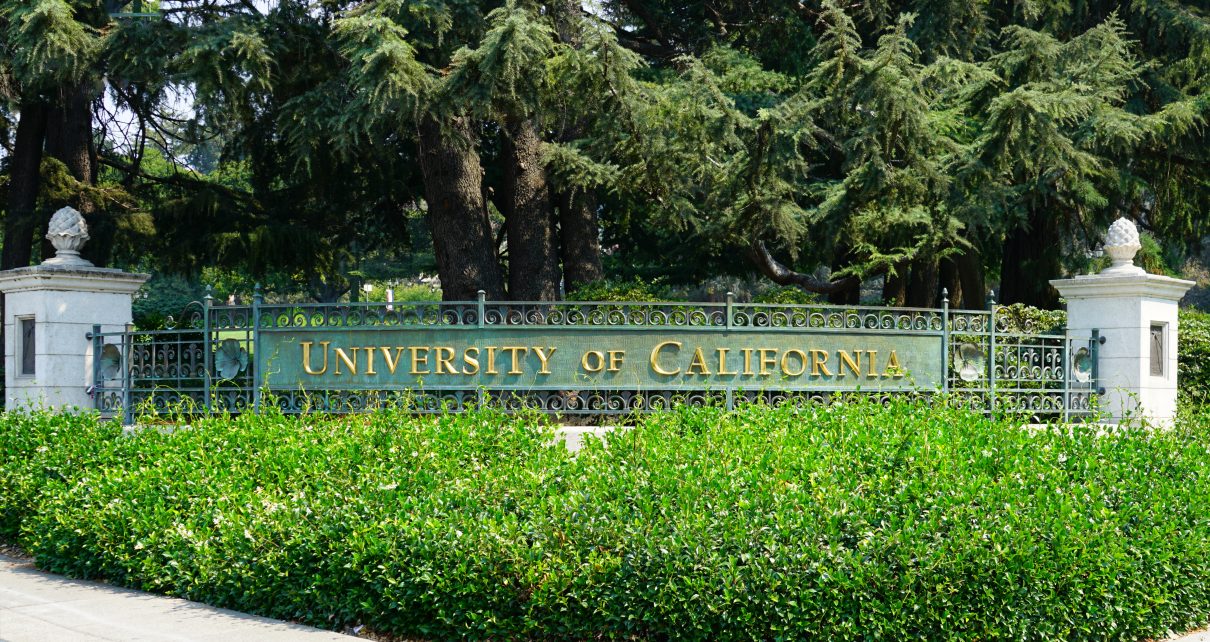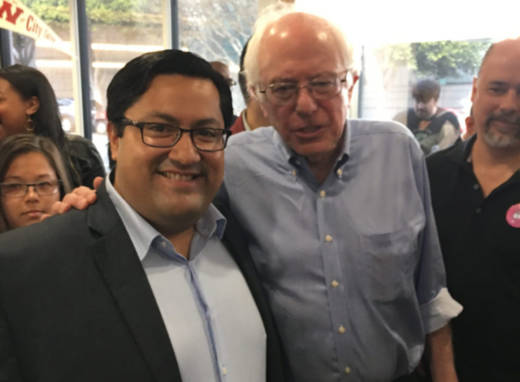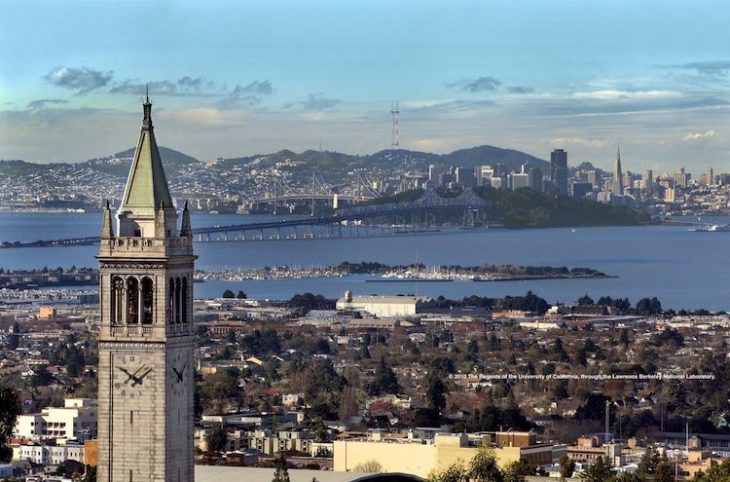
View of the campus of the University of California, Berkeley. (Photo: EQRoy, Shutterstock)
Othering, Belonging, and You: A Look at a Befuddling Berkeley Institute
Good to know that othering is entangled with othering and that othering cannot be discussed without discussing othering
By Thomas Buckley, July 10, 2023 3:32 pm
Note – this is yet another installment of the Globe’s semi-regular series entitled “Hidden in Plain Site” in which we look at what various influential California organizations are saying/claiming/promoting etc. on their websites.
Today’s entry is The Othering and Belonging Institute at the University of California, Berkeley. We did reach out to the OBI for clarification of certain points (you’ll see the reason why shortly) but they did not respond so, as per practice, the questions will be included in this article where appropriate. Finally, we asked the Berkeley press office for the financial figures regarding the OBI. They were not provided in a timely manner but may be offered in the future (explanatory note below.)
How do you eat Mount Kilimanjaro?
One bite at a time.
And, for lack of a better analogy, that is the shape this article on the Othering and Belonging Institute (OBI) will take – one chunk of incomprehensible woke/progressive/equitarian nonsense at a time.
The OBI, started in 2012 as the UC Berkeley Haas Institute for a Fair and Inclusive Society, originally consisting of eight Haas family foundation endowed multi-disciplinary chairs at Berkeley. It now has 39 staffers, six senior fellows, and 10 graduate students.
Even a cursory glance at the OBI site reveals it to be the epitome of smug (executive director John Powell only uses lower case letters in his name so it’s john a. powell) self-satisfied, all-knowing, but in fact hyper-exclusionary government-funded double-plus-goodthinkery that has cut a ruinous swath through society during the past few years.
From race to climate to LGBTQIAA2S+ to “democracy” to the shifting of cultural “narratives,” the OBI cone of confusion is nearly a parody of a satire of an ironic presentation of the corrosive collectivism cult that is hellbent on changing society into one that is a simple and easily controlled infinitely malleable mass of carbon atoms.
The OBI “centers lived experience” – as opposed to actual reality – it wants “to take command of how a debate, such as the entire concept of public space or citizenship, is framed in public discourse in order to construct and employ new narratives,” and stresses its core concept of “targeted universalism,” which “is a platform to operationalize programs that move all groups toward the universal policy goal as well as a way of communicating and publicly marketing such programs in an inclusive, bridging manner.”
Though they wouldn’t answer who exactly sets those universal societal goals, it can be safely assumed they themselves would be very much involved in doing so.
This is how the OBI describes itself:
“The Othering & Belonging Institute at the University of California, Berkeley advances groundbreaking research, policy, and ideas that examine and remediate the processes of exclusion, marginalization, and structural inequality—what we call othering—in order to build a world based on inclusion, fairness, justice, and care for the earth—what we call belonging…Belonging, as OBI defines it, means having a meaningful voice and the opportunity to participate in the design of political, social, and cultural structures that shape one’s life — the right to both contribute and make demands upon society and political institutions. At its core, structural belonging holds a radically inclusive vision because it requires mutual power, access, and opportunity among all groups and individuals within a shared container (such as a society, organization, club, etc.)”
And, for those of us who may or may not be in an inclusive “shared container,” here are some of the ways they try to do that.
But first, the finances. The OBI did not respond to the following questions:
- How is the OBI funded? The school, grants, program work, etc. and who are the largest donors?
- How many employees does the OBI have and what is the average total compensation package per person?
- Does the OBI earn money by performing specific tasks – say a city wants a report on X, do they fund it?
- Does the OBI award any grants itself and if so to whom?
When asked, a Berkeley press officer stated “I have learned that it will take some time to get to this matter, as the team involved is attending to a number of other matters. We won’t be able to meet the new deadline, Apologies for the delay.”
Note –the deadline referred to was later than the original and this statement came after two other emails inquiring into the nature of this article, one asking for “additional context” and another wondering “what is the impetus for the story?”
The Globe does not play such public relations games.
Therefore, the exact nature of the funds flowing to and from the OBI is not currently known; what is known is that – as a part of the UC system – public funds, to whatever extent, are in some fashion involved.
Now to the OBI’s areas of interest. Let’s start with targeted universalism and here’s a video from the founder explaining it.
Basically, it’s having a big goal everyone theoretically agrees with and then creating and implementing specific “targeted” projects to meet different parts of the main goal.
The OBI declined to answer the following question: “As to targeted universalism, who is envisioned to set both the goals and the target projects? On the website the example given involves math – what about other more controversial goals and programs – how are they determined/justified/etc.?”
Aspects of the concept include “interventions undermine active or passive forces of structural exclusion and marginalization,” that by “(B)y emphasizing the universal goal as a way of justifying a diversity of implementation strategies, transformative change possibilities can be envisioned, pursued, and aligned,” it can open up “the possibilities for experimentalist, manifold pathway policy regimes.” That being said, it does entail a requirement of “deliberate strategizing, ground-truthing, and smart organizing.”
If you do not know what “ground-truthing” is, good for you – but just in case you’re interested it means “real.”
Moving on to narrative power, that involves – speaking of real – changing the nature of the perception of reality, in this case with the intent of influencing policy and politics (you know, your government):
“Today, we are in desperate need of new stories, particularly those that can counter the individualist, competitive, and deeply exclusionary dominant narratives that command our collective psyche and which have allowed for the rationalization of ongoing group-based injustice in our society.”
The word “collective” comes up a lot with the OBI, by the way. Anyway, they declined to answer the following: “As to narrative power, does the OBI take an active role in trying to shift narratives it finds problematic and what would be a few examples of such narratives?”
The fullness of the concept can be found here, but, in short, it involves leveraging pop culture, that “results from a sophisticated combination of collaboration, strategic communications tactics, and cultural engagement, all attuned to key audiences and societal trends,” and changing words: “terms like “ex-con,” “felon,” or “criminal” dehumanize and stigmatize, and should be avoided in favor of, for example, “people returning from prison,” “people with felony convictions,” or, “neighbors/co-workers who’ve paid their debt.”
In other words, it involves exactly what has been happening in the media during the past five or ten years, which is made even clearer in a California-specific action plan. The plan involves “Advancing a Strategic Narrative—developing an infrastructure with muscle to increase public support for a responsive and accountable government and create an inclusive-bound political identity” that rejects the “divisive, patriarchal, white supremacist, individualistic, and consumerist based approach and strategies.”
The narrative shifting is then amplified through an OBI “Network for Transformative Change,” whose “work is happening with an eye on surfacing game-changing strategies and new applications of our research and policy analysis to deliver powerful levers for change.”
“Surfacing” is not a typo.
The OBI did not respond to the following question: “The general thrust of the OBI is clearly a very progressive one. Is the OBI a political organization?”
Speaking of politics, the OBI has a deep and abiding concern that democracy itself is under direct threat from – surprise – Donald Trump.
“Over the past ten years, anti-democratic actors like Donald Trump in the US, Jair Bolsonaro in Brazil, and Narendra Modi in India have become both real and symbolic threats to democracy globally. At OBI, we view these developments with great concern, as we recognize democracy as a core expression of belonging at the structural level.
Indeed, belonging means that people in any system or container have the right to not only be included in that system, but to make demands on that system and even change the structure of that system itself.”
There’s that “container” again. People containers are very popular amongst totalitarians…but I digress, so let’s continue with a further statement from the OBI:
“(We) are committed to strengthening multiracial democracy by bridging across lines of difference to counter populist authoritarianism while continuing to center the needs and concerns of marginalized groups. Through in-person and online convenings, original research, story-sharing, funded joint experiments, and other activities, Forum members evolve their understanding of the concepts of othering, belonging, breaking and bridging as they apply to different regions, and share practices and strategies to counter polarization and democratic erosion—all while grappling with the reality of power, privilege, and positionality in our diverse social and cultural contexts.”
Again, for those unaware, a convening is a meeting and a convener is the chairperson/organizer.
For his part, Powell – sorry, powell – recently co-authored an article in the Nonprofit Quarterly that noted although “the defeat of Donald Trump in the 2020 presidential election and the prosecution of January 6th insurrectionists might suggest that US democracy has remained strong through years of social and political instability,” the far-right extremism threat remains, and disinformation and “Russian government-backed trolls” have been serious impediments to at least parts of the anti-totalitarian movement.
The OBI declined to answer the following question: “What is the OBI position on the mis/dis/malinformation debate currently brewing? Does the OBI believe in free speech absolutism or does it tend to support efforts to curtail such information?”
It, however, should be readily apparent where the OBI stands on that issue.
Thankfully for the world, the OBI “staff is working on narrative strategy and civic engagement develop key partnerships with community organizations and grassroots advocates in California and nationally.”
Just a reminder: California Endowment Advocacy, Communications, Etc. Grants Dwarf Others.
That leads us to non-public money, or as the OBI puts it, strategic philanthropy, a topic that seems to come up quite often of late.
The OBI, which was started and presumably continues to receive such funding, for some reason does not seem to have a problem at all with private foundations, etc. financially bulldozing societal opposition:
“Philanthropy that fuses with targeted universalism becomes strategic—it targets creation of structures that sustain equity and strengthen it. In the context of increasing needs and the shrinking public dollars associated with austerity, the private sector, notably philanthropy, has become a force underwriting emerging demands. Private dollars alone cannot replace the type or amount of government funding. This means there is a need to make philanthropy more than a force for funding critical social programs and emergency assistance. Philanthropic organizations and the social ecosystems they influence can be organized and operate to realizing durable social change and jump scale beyond emergency needs.”
This stance is part of OBI’s Just Public Finance movement which states:
“Othering is financed by economic exclusionary systems” and “that inclusion and equity require transformed economic structures and institutional practices. We place othering and economy as an entangled and fundamental force for othering. The economy does not operate independently of othering, and we cannot talk about the economy without talking about othering.”
Good to know that othering is entangled with othering and that othering cannot be discussed without discussing othering. It seems as if we found Vice President Harris’ side hustle: writing for the OBI.
The Just Public Finance sector has three foci: Public Finance & Economic Power, Debt, Credit, & Austerity, and Financialization: The Global Financial System. It seems curious, for all of the OBI’s talk of equity and inclusion, that the “global financial system” webpage reads thusly: “SORRY, PAGE NOT FOUND Well, that’s one area we’re unsure of.”
Bringing us to global justice.
To wit: “The Othering & Belonging Institute’s Global Justice Program (GJP) focuses on cross-sectoral themes that connect the local to the global and vice versa by examining structural marginality and promoting global inclusivity while taking into account local complexities and knowledge productions.”
Knowledge productions? Is that anything like “gathering learnings?”
Global justice focuses on islamophobia, forced migration, and inclusiveness. As to islamophobia, that appears to take up a surprising amount of the OBI’s global justice bandwidth despite the fact that it focuses for the most part of the United States.
Staying on the international front, the OBI last year appointed its first “global senior fellow,” one Bayo Akomolafe, Ph.D., a “widely celebrated international speaker, posthumanist thinker, poet, teacher, public intellectual, essayist,…”
An example of Akomolafe’s worldview would be his take on whiteness, which is not limited to people who happen to be white. “Whiteness is speculatively the genocide of relations. To borrow a phrase from Dr. Erin Manning, it is the placement of bodies in strict, rigid, unforgiving, immobile, sterile identitarian boxes as a place-making, world-building project.”
Personal note – I did philosophy of science in school so I’ve waded through some very dense material, hermeneutics this, neo-Kantian that. And while Akomolafe seems to think science and the Enlightenment have come to an end, I cannot say for certain that he means that as the jumble of opacity he wends his way through makes being sure exactly what he means about anything impossible.
From his website:
Science and the rationality of the city have granted us insights into the working of ‘nature’, while simultaneously obscuring other relations to the stabilized image we effortlessly christen “nature”. To illuminate is to obscure; to gain clarity by turning to a source of light is to create new shadows. Knowing anything is an exercise in loss, in complementary postures foregone, in sensations exchanged, in stabilities reinforced, in fools suffered. Something is always missing. The question isn’t if my version or your version of the world is true; it is not if ‘anything goes’; it is: what natures are we co-performing, and what worlds have had to die for them?
For the full impact, I would encourage you to watch this video and I dare you not to be instantly transported back to that bongwater-infused dorm room of yore.
The above look at the OBI is only the tip of a very silly sounding but very deadly serious iceberg. But unlike the iceberg that was hit by the Titanic, the OBIceberg is actively prowling the oceans of power looking for civilizational ships to sink.
Your tax dollars at work.
Here are the other questions the OBI did not respond to:
• Considering the collective nature of the OBI work and policy positions, exactly what role does the OBI see the individual as playing in society and should that role be subordinate to the community?
• How does the OBI think the pandemic response was handled – too little, too much, just right?
• Does (or has) the OBI work with any government agency and/or NGO like the Virality Lab that have been identified as part of the “censorship-industrial complex?”
A final question – regarding the recent Supreme Court ruling ending affirmative action in college admissions – was also not answered. However, I did find a press release and podcast – featuring the openly discriminatory Erwin Chemerinsky that seems to explain the OBI position.
And from the release:
“We remain committed to working with institutions to support their efforts to promote and maintain diversity despite this disappointing ruling. To that end, we have prepared detailed guidance on how to “advance equity” within the parameters of law, including those laid down today. Our new guidance provides helpful distinctions between confusing and often conflated terms, as well as practical guidance for what is permitted and what is not with many examples.
There remains ample room, despite today’s ruling, for public and private institutions alike to take steps to reduce racial disparities in society or within their organizations, to promote and advance diversity in a variety of arenas, and to advance the vision of a society where everyone can belong.”
- Benefit Fraud Problems and Solutions - November 7, 2024
- A Little Exit Poll - November 5, 2024
- Tomorrow’s Headlines Today! - November 5, 2024





This stupidity is straight out of a William Gibson cyber-punk novel, specifically “The Peripheral” (the book, not the show) – wherein the corrosive effects of massed wealth and differential access to “tech” (vast computing power) and “quants” (skilled analysts) turns the world into a boring game of Lords and Ladies smashing their way around the lives of everyday people. This institute is a reflection of some twisted pervert with a horde of cash behind him or her. Period.
Yes, indeed, Billy G.
“Good to know that othering is entangled with othering and that othering cannot be discussed without discussing othering. It seems as if we found Vice President Harris’ side hustle: writing for the OBI.”
Sorry Thomas, but I don’t believe that VP Harris has the ability to create this level of mind-numbing leftist gibberish. Although, I do believe that she can/has been well-trained to recite it. 🙁
You have a point – I stand corrected.
Glad you tried to wade through Bayo and you’re right – it could be a memeapalooza
Sorry i didn’t put a “You Must Be This High To Watch This Video” warning on it..
“For the full impact, I would encourage you to watch this video [of Bayo] and I dare you not to be instantly transported back to that bongwater-infused dorm room of yore.”
Thomas, in watching this video (and I could not get past 10 minutes of Bayo) it occurred to me that we could MEME the signer with YOUR translation of his verbage. Like using bubbles containing your words as done in the comic books of old. “Wholly white container, Batman!” After all, do we know that the signer is actually signing their gibberish correctly? 🙂
So the OBI, started in 2012 as the UC Berkeley Haas Institute for a Fair and Inclusive Society, originally consisted of eight Haas family foundation endowed multi-disciplinary chairs at Berkeley and now has 39 staffers, six senior fellows, and 10 graduate students? The Evelyn and Walter Haas, Jr. Fund web page claims that it works to advance equality and justice so every person can thrive and live life with dignity and hope. The reality is that the fund does the opposite? It was probably established by members of the evil Khazarian Mafia faction of the Ashkenazi Jews to promote inequality and injustice while destabilizing society by stripping away dignity and hope?
And, now their student loans are all paid off. What a country!